Playing Gigs with a Band
The culmination for any musician aspiring to play in a band is when you actually get out on stage and start playing gigs.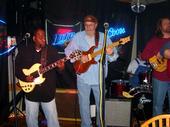
Playing for a live audience is a great experience and one that can be extremely satisfying. For a guitar player that has spent countless hours practicing their chops, it is the ultimate "high".
As much fun as gigging can be, it is also important to keep in mind some basic considerations and business issues to make the live band experience more rewarding and gratifying.
Be Punctual
 Being on time is crucial to playing live gigs. This may sound like stating the obvious but I have seen bands, or band members, that don't seem to own a watch, and have the attitude that they will "play when they get ready to play".
Being on time is crucial to playing live gigs. This may sound like stating the obvious but I have seen bands, or band members, that don't seem to own a watch, and have the attitude that they will "play when they get ready to play".If the gig is scheduled to start at 9:00pm and the band doesn't show up with their equipment to set up until 8:45pm, club managers can get a little nervous. They may even dock the band's pay, or worse, cancel the gig.
Show some consideration to the club and the audience by being on stage ready to play at the appointed time.
Setting Up
Most clubs and venues would prefer that the band is set up well in advance of the gig. Try to coordinate with the manager a time when you can get in to set up your equipment earlier in the day.
Patrons don't want to listen to sound checks and amp testing while they are eating dinner or trying to have a conversation, so be aware and respectful of that. It is their money that you will be putting in your pocket.
Coordinate Times
Most clubs have a time schedule they want you to follow. A specific starting and ending time and how long they want you to play your sets.Some insist on a regimented - 45 minute sets and 15 minute breaks - schedule. Others are more flexible and will let you "read" the crowd.
One cover band I play in will always open up, when possible, with a 90 minute set. That's long for a lot of bands, but it tends to keep the late dinner crowd in the club longer than they normally would. When they stick around, they spend more money and the club owner is happy.
Be mindful of the "stop" time as well. If a club has a policy that entertainment ends at 1:00am it is probably for a reason. They are preparing to close the doors and want to clear out the patrons so they can get the employees off of payroll. There may also be local liquor laws involved. If you have a rowdy crowd at the end of the night insisting on "one more" try to make it just "one more". Preferably a slow song that will bring them back down to earth and out the door!
Mingle
When it's break time you sometimes just want to go outside and clear your head for a while. And you should. But don't forget the audience that makes it possible for you to be there. Try to at least stop by and say hello to some folks in the crowd and acknowledge their existence. It will go a long way to spread some goodwill, and if they keep coming out, you will keep getting hired to play the gig.
All for One
A band is a "group" of people, not just one individual. As a guitar player it's great to get the chance to step out there and shine. Just be mindful of the fact that others are up there as well waiting for their chance to shine.By truly listening to all the other parts and playing as a member of the "whole", you will make the band sound better. A band that sounds good will be popular and get invited to play more gigs.
Dress the Part
In a lot of bar gigs, jeans and T-shirts work well. But even in those types of gigs, dressing a notch or two above the norm won't hurt. It will help portray a more professional image.
If you are doing a wedding reception you may want to re-think the jeans. Any type of gig where the patrons are wearing suits and evening gowns requires a little more effort in the dressing room.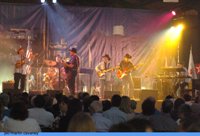
You don't necessarily have to go out and buy a new wardrobe for upper end gigs, but these gigs usually pay a lot more than clubs, and the ones that hired you have a higher level of expectation. If you are unsure what to wear, dressing in an all black outfit, that is clean and pressed, is usually a safe bet.
A lot of this is, of course, common sense but I have played high profile corporate parties to a crowd of tuxes, and had a band member show up in jeans. You are getting paid to be there, so try to dress appropriately.
Have Fun
It is amazing to see people who are otherwise calm and nice, turn into monsters when they get on stage. Constantly stressing out about the crowd reaction and mistakes made on stage is a recipe for disaster.
I can promise you that everyone of us makes mistakes on stage. It is part of live music. It can't be avoided. What should be avoided is how some people handle it. Lashing out and criticising while on stage is not only unprofessional, it's disrespectful to fellow band mates. The truth of the matter is that most people in the crowd don't know when you made a mistake. The average listener doesn't hear music they way you and I do. Most of them are too busy talking, eating, drinking and dancing to know that you should have hit a G instead of that F#.
The truth of the matter is that most people in the crowd don't know when you made a mistake. The average listener doesn't hear music they way you and I do. Most of them are too busy talking, eating, drinking and dancing to know that you should have hit a G instead of that F#.
The best way to handle a mistake is to keep playing without acknowledging that it ever happened, and have a good laugh about it on break.
If you get on stage and make up your mind that it is a blessing to be up there doing something you love to do, and that you are going to have fun, irregardless of any hiccups - you will be able to put all your focus on what's truly important - making good music!
Please do not hesitate to contact us with any questions!
![]()


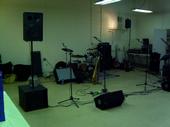 Band rehearsal is much the same. It is almost impossible to play music with the same level of intensity as when you are on stage with the adrenalin flowing in front of a live audience.
Band rehearsal is much the same. It is almost impossible to play music with the same level of intensity as when you are on stage with the adrenalin flowing in front of a live audience.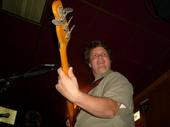 prepared to go to work. If you have agreed that rehearsal starts at 6:00pm then be there a few minutes ahead time to set your gear up and be ready to hit the first lick at 6:00pm.
prepared to go to work. If you have agreed that rehearsal starts at 6:00pm then be there a few minutes ahead time to set your gear up and be ready to hit the first lick at 6:00pm. 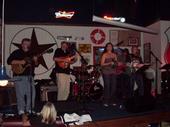
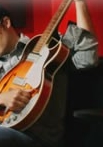 If you are contemplating joining or forming a band, one of your early decisions will be whether you want to play covers or originals. There are considerations for both courses of action.
If you are contemplating joining or forming a band, one of your early decisions will be whether you want to play covers or originals. There are considerations for both courses of action.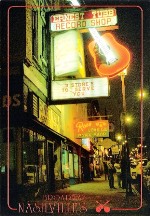 The top level is, of course, an original band that gets signed to a label deal and is out touring the concert circuit. Although this is the ultimate aspiration of most musicians choosing the original route, the intensity of the "business end" of the music at this level can leave many a "purist" disillusioned.
The top level is, of course, an original band that gets signed to a label deal and is out touring the concert circuit. Although this is the ultimate aspiration of most musicians choosing the original route, the intensity of the "business end" of the music at this level can leave many a "purist" disillusioned.


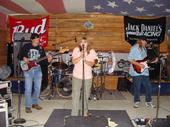 Will everything be sold off and the money divided? Will the equipment simply be divided? Will other members have an option to buy the equipment?
Will everything be sold off and the money divided? Will the equipment simply be divided? Will other members have an option to buy the equipment?  In my experience, the best and most talented musicians are the most humble. The ones that don't feel the need to "tell" you how good they are. Conversely, the players that go out of their way to inform you how great they are, are usually not.
In my experience, the best and most talented musicians are the most humble. The ones that don't feel the need to "tell" you how good they are. Conversely, the players that go out of their way to inform you how great they are, are usually not.
